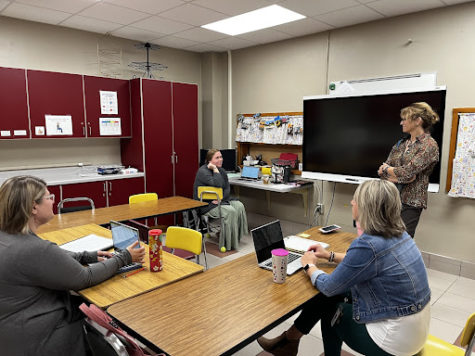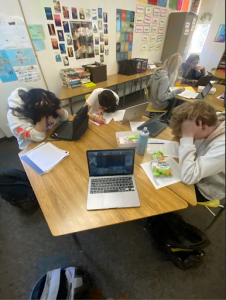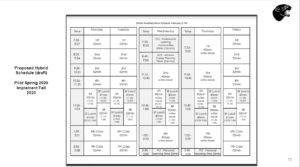Teachers Need to Get on the Same Page
October 20, 2022
Imagine starting your first year at SPASH. The first day you spend getting to know the teachers and being bombarded with rules and expectations completely different from those you had previously. Day after day, class by class, you need to change what you do and how focused you need to be depending on where you are. Homework starts piling up and you just wish you could get a handle on everything that is happening in all your classes. You wish that all your teachers were on the same page with expectations for their classrooms, workloads they give, and the style in which they teach so you could have an easier time learning and staying caught up. Teachers at SPASH need to start working together to create a more cohesive school environment to allow students to be more successful at school.
Rules are Complicated
All teachers at SPASH have very few rules they are expected to uphold that are common between them. That being said, when asked about what rules and expectations all teachers are expected to uphold, Ms. Samplawski, a teacher at SPASH, stated, ”We are expected to uphold the cell phone policy, hat policy, keeping things organized during passing time, and not sending kids to a la carte from the classroom.” When Ms. Bowling was asked the same question, she stated, “We are expected to keep up on attendance, following the cell phone policy, grading on time, and uniform assessments.” Although both teachers said the same thing, they described rules that relate to general things that should already be expectations that the students are following, they are not necessarily rules for the teachers. This isn’t the teachers fault, but rather a fault within the whole district. Rules for the teachers might look more like the requirements for vocabulary words or learning targets. Their expectations should have more to do with the things that relate to expectations for what the teachers should be teaching, not what they should be telling the students to do.
When asked about her opinion on classroom rules, Hanah Netys, a junior at SPASH, stated, ”Classroom rules should not be super strict if they are all different, because then it can be hard to keep track of and follow. If all the rules and expectations were the same in all my classes, I would be fine with having more strict rules.” Hanah has a great point there. If the teachers were on the same page with their rules, most students wouldn’t care about them being super strict. If the teachers only have rules that are about what students can do, how is that fair to the students? If we have to follow specific expectations that help out the teachers, the teachers should have some expectations that help us out too.
“Students need to rely on themselves. If they want to succeed I will provide everything to get them there, but the real work will come from them,” stated Ms. Samplawski, a teacher at SPASH. If all teachers thought in this way the school would be an easier place. Some teachers do too much for some students who are helpless, and leave those who truly want to succeed without the proper support they might need. This doesn’t mean ignoring students if they are doing bad, but rather making sure they understand that they need to put in work because you, the teacher, can’t do anything more and leaving it at that until they reach out for help themselves. School is about the students, but we still have expectations, and we need to meet them just as much as the teachers do.
What do we Have?
How can teachers actually start communicating and truly being on the same page? Well, let’s take a look at what they have right now. When asked whether or not other departments create rules and expectations for them to work on and follow, Ms.Bowling stated, ”I believe so, the other departments are supposed to but I do not know for sure.” The departments at SPASH could all have completely different goals and rules within them. One department could be working on making sure they teach the same content while another is focusing on making sure they get tests graded on time, or giving enough homework time. Some might not be working together on anything at all. Departments could have vastly different priorities, and we would never know, even if we were the ones feeling the effects.
When asked if the different departments at SPASH communicate to make school more cohesive for students, Ms. Bowling stated, ”There are staff meetings, we discuss common expectations but do not go into specific detail.” If teachers do not go into detail any further than the common expectations how do you truly assess the quality of a teacher and what they are doing? Is the whole teaching system just based on trust? Do teachers not get re-assessed on what they do? Does nobody check in and make sure students are being taught what is needed in ways other than just stressing them with standardized testing?
So do teachers from other departments really even discuss things at all? ”No, we do not collaborate on teaching ideas,” stated Ms.Bowling. If the teachers do not communicate on ideas and teaching styles, how do they get input on their ideas that isn’t biased or from the same point of view they already have? When asked about ways to make departments work together better, Ms. Samplawski stated, ”Being on the same page is important.” Having similar ideas and goals for your classes, and other classes that teach similar things, will make it easier for the teachers, because then they can work together more. It would also make it easier for the students because they will be getting the same things from either place. Then they would not have opposing ideas from similar sources.
”It is easier to follow and things go more smoothly when it is all the same from class to class,” said Austin Smith, a SPASH junior. Although you might think having the same things over and over would be boring, in a situation like school where you already have to use your brain enough to just pass the class, having the same things over and over might be the change we all need. An example of this could be: If one class allows you to talk freely, but another requires you to always raise your hand, it can be very confusing. If it was just required to raise your hand before talking in all classes, it would make it easier to not speak freely in that one class. It can go the same way with other things in school, if rules and expectations were the same everywhere, there would be no reason not to follow them.
How Can We Improve?
When asked if there is anything the school could do to improve the school day, Austin Smith, a SPASH student stated, ”If school had no homework it would be way easier, or at least having time to do the homework in class.” Without the proper time to work and do things in class it makes it hard to have the right notes, and without the right notes, it makes it hard to do the homework, and if you don’t do the homework, you get bad grades. All teachers should be on the same page about allowing proper time for homework, and assigning proper amounts. If they do this, students will be happier and more engaged in all their classes, rather than worrying or trying to get homework done in their other classes.
”It is important to give timely feedback. Summatives are important to get back in case of retakes, and formatives are what prepare you for the summatives, so having those back with proper feedback is important as well,” stated Ms. Samplawski, a teacher at SPASH. All teachers should agree that the bare minimum they can do is give back tests and assignments within 3 days of a student completing it and turning it in. When asked what things make school difficult for him, Austin Smith, a SPASH junior said, ”I only struggle in the classes that are fast paced, it makes it hard to keep up on everything.” If all classes were taught in similar ways where you only need the notes to get a decent grade, students would be more successful, even if they don’t want to try. Teachers could upload their notes so they would be available online for students who might miss, or struggle to pay attention in class, that way they wouldn’t have negative repercussions that just keep pushing them back further and further.

Let’s Make the Change
But all teachers can’t teach the same way or have the same rules because all classes are different! While that may be true in some scenarios, a good example of the same page would be having classes where every day you get a notes sheet, and the teacher presents on that sheet. The students who are uninterested just fill in the blanks, and the students who really want to learn will listen and be engaged, learning more from the teacher’s presentation that goes more in detail. Maybe the notes involve something where you work in a group, maybe have discussions beforehand, or incorporate other things. But at the end of the day, if all you do is fill in the blanks on the notes and study those notes, you can at least pass the class.
When asked about ways to improve school, Hanah Netys, a SPASH student, said, ”If there was more consistency throughout my day, and teachers who are all in mostly positive moods, it would make my day easier.” Consistency helps in extreme amounts. That being said, another change we could possibly make would be something as simple as having all the teachers greet their students at the door with a smile and “hello.” You never know how that one, seeming to be minuscule thing, might change a student’s outlook on the whole day.
One also might argue that for all teachers to be on the same page it will take more meetings and communication than teachers have time for on top of all their other responsibilities. Maybe it’s hard to do that, but schools are about teaching the students, not the ease of the administrators. Although the expectation is not for the teachers to make these changes all on their own, we need their voices to support making change. Even if school is all about the students, it doesn’t mean that the administration wants to hear our voices, especially if hearing us will give them more work.
Teachers have their own lives and things outside of school. Most of them probably don’t want to do work outside of the work hours they get paid for, as they should. This means that we need to build time into their day to talk about and focus on making these important changes in the classroom. If we focus on making the change inside the classroom and during school hours, when the teachers are getting paid to be there, odds are that they would all be on board and excited to get started. Especially if they know the change will actually have a benefit for them, unlike the vocabulary words that were recently implemented. Maybe if the district put in a little extra work to make school easier, over time it would turn around and make the teachers’ lives easier too. It could also make school a more positive place to be for everyone. Maybe then students would have more positive attitudes, and be more excited to learn like they once were in elementary school.
Think of the Positives
Although it might seem like a super big, complicated goal to have all teachers be on the same page and teach in the same way, if you just start with the little things and look at how good it could be for the students, it makes it very reasonable and achievable in the near future. Students could have a day filled with learning and understanding no matter what level they are at, or if they were able to make it to school that day, and teachers could have easier days that don’t take as much out of them physically and mentally.






































































